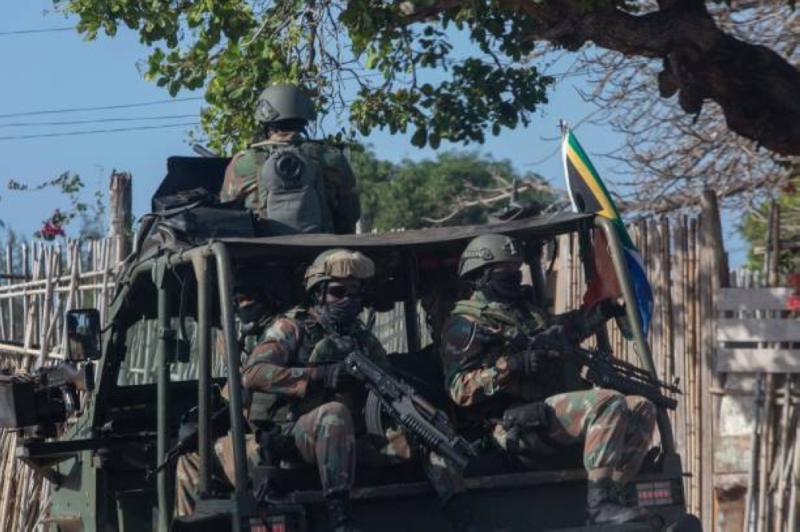Desperate Moz rebels conscript child soldiers
Mbongeni Mguni | Monday October 11, 2021 06:00


While SADC forces in northern Mozambique are riding the crest of the wave following recent high profile victories against Islamic insurgents, signs are emerging that the next phase of the war in that country may be the most difficult. SADC Troika leaders, including President Mokgweetsi Masisi, this week approved the extension of the SADC Mission in Mozambique (SAMIM) meaning the nearly 300 Botswana Defence Force (BDF) troops and their regional counterparts will continue the war in that country until March 2022.
SAMIM troops, led by South Africa and deputised by Botswana, recently destroyed key rebel camps in Cabo Delgado, killing a number of terrorists and rescuing kidnapped citizens.
Late last month, the regional troops killed the terrorists’ base leader, Sheikh Dr Njile North striking an important blow to the rebels’ morale and organisation. The three-month extension of the SADC troops’ deployment, however, is expected to mark a new, dangerous and unprecedented angle to the war, as leading NGO, Human Rights Watch (HRW) warns that rebels are now kidnapping and deploying child soldiers into the battle. “The armed group, known locally as Al-Shabab, has abducted hundreds of boys, some as young as 12, trained them in bases across Cabo Delgado province, and forced them to fight alongside adults against government forces,” reads a recent report by HRW Africa.
“In the town of Palma, parents said they watched their sons wield guns when they returned with other fighters to raid their village,” said the rights group. Palma, a small coastal town in northeastern Mozambique, was attacked by more than 200 terrorists in March, with scores killed, including citizens from South Africa, Britain and Zimbabwe. That attack, coming four years after insurgents first began their brutal attacks in Mozambique, galvanised regional leaders. Even Maputo authorities, who were previously reluctant to accept regional help, would later accede to Masisi’s pressure as the then SADC defence chair.
According to HRW, the rebels are reacting to the regional pressure by resorting to an old tool used by other brutal bush fighters across the continent. Analysts say the use of child soldiers by rebels such as those in Mozambique and previously by Joseph Kony’s Lord’s Resistance Army, is designed to coerce communities into silence and fear, radicalise more young people and complicate the job of professional military units. “Using children in fighting is cruel, unlawful, and should never take place,” said Mausi Segun, Africa director at Human Rights Watch.
“Mozambique’s Al-Shabab should immediately stop recruiting children and release every child in their ranks’’. HRW says it spoke by phone with four parents of kidnapped boys, a former child soldier, and two witnesses to abuses. The child soldier and witnesses had escaped from the Al-Shabaab training base in the town of Mbau, where they were held captive for several weeks.
The latest tactic echoes warnings by Masisi, as the BDF Commander-in-Chief, when he advised the departing local troops in July to be ready for unconventional tactics in Mozambique.
“Brace for a deceptive enemy likely to use underhand tactics,” he said. “As professionals, you stand for much more than they do and must avoid emulating them and sinking to their level.”
Yesterday, SAMIM spokesperson, Major Patrick Mfaladi of the Botswana Defence Force told Mmegi the regional forces were yet to encounter child soldiers in the theatre of war.
“As SAMIM we haven’t encountered child soldiers in our operations but we are aware that children, women and men have been abducted in some instances during the attacks by terrorists,” he said. “Further to this, we have rescued four elderly women during our operations and have since been handed to the national authorities.” The upcoming phase of the war appears uncertain and despite their recent victories, SAMIM forces are reluctant to say they have pushed the rebels into a corner. “The situation in Cabo Delgado Province is calm but remains volatile,” Mfaladi said.
“Terrorist operations are unpredictable, however, SAMIM forces are hard at work in the operational area to ensure that the security situation and the livelihoods of the people of Cabo Delgado and the Republic of Mozambique can return to normalcy.” He added: “The extension of the SAMIM means that operations will continue for the next three months without any operational pause.” From his reported reluctance to admit regional forces, Mozambique president, Filipe Nyusi is reportedly pleased with the SADC troops and has expressed hope that they will continue beyond March 2022 if the need arises.
Upon his arrival from the SADC Troika on Thursday, Nyusi was quoted by Mozambican news agency, AIM, as saying the three-month extension was to ensure “full clearance” of the areas held by terrorists and establishment of security.
